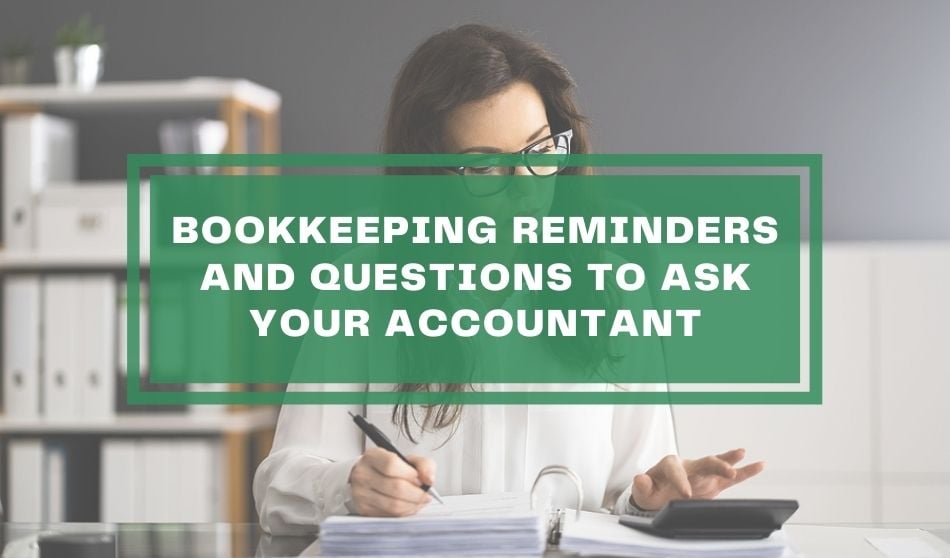
Tax season is coming quickly which means wrapping up bookkeeping and get those last-minute questions answered. Get ready for the upcoming tax season with these property management bookkeeping reminders and important questions to ask your accountant.
Bookkeeping Reminders
An accountant’s time can be costly so reviewing your ledgers and information periodically, especially at the end of the year is paramount to saving you time and money.
Uncategorized transactions
An uncategorized transaction likely will not follow properly to end-of-year reports. For example, a private landlord may need a Schedule E report so transactions will need to be categorized to populate.
Income and expenses
Review ledgers for any missing data-entry that will close out the year. For instance, if you are on a cash-based accounting system, only enter items that have been paid or deposited within the year.
Move-outs and tenant security deposits
This is a perfect time to review tenant rent and security deposit ledgers. Remember to post all payments received security and/or other deposits returned, and any outstanding ledger entries before year-end.
Review ledger balances
The best way to make certain all ledger balances are correct is to reconcile the bank ledgers. If this task has slipped off the to-do list, set aside some time to reconcile your account ledgers as soon as possible. In addition, a 3-way reconciliation will help highlight any omissions or errors.
Verify vendor and owner information
Ensure that vendor and owner information is prepared for 1099s and for tax season. Keep completed and current W-9s and contact information on file for each vendor and owner. If your property management software processes 1099s, verify the tax and contact information for each vendor and owner is accurate in the system prior to processing.
1099s Reminder: Property managers send 1099s based on net rent paid to owners. If an owner is requesting the 1099s be calculated based on gross rent, contact your accountant and legal counsel for advice.
Meanwhile, as you are getting these last-minute bookkeeping tasks completed, schedule an appointment with your accountant to discuss leading up to tax season. The following are the topics and questions you may want to bring to the table.
Questions to Ask Your Accountant
Deadlines
Aside from the 1099 deadlines available online, ask your accountant what other deadlines are on the horizon based on your business structure for items such as:
- quarterly estimated tax payments
- employee and employer wage and tax forms
- state and federal tax returns
- extension dates if needed
Record Keeping
On the one hand, accountants can be worth their weight in gold. On the other, if not approached with careful planning, can cost a small fortune. The next two questions could save you a bundle of money.
How can I help you do a better job for my portfolio?
What information do you need from me?
Ask how to prepare, document, and organize financial reports from an accountants’ perspective. Understand the reports and information they need from you and the format they would like that presented.
Note: Many property management software systems allow for accountant user permissions so that the accountant can procure and download reports themselves. Pros: they can pull reports themselves. Con: they may not know how to navigate the software and might bill you for that learning curve unless otherwise negotiated.
Deductions and Expenses
Fortunately, taxes are not calculated on gross revenue and deductions and expenses can be claimed. Your accountant is your guide so be sure to ask:
What business expenses can I deduct?
If you work from home ask about deductions for office space and utilities. Property managers and landlords spend much time traveling for inspections, showings, post office, supply runs, banking, etc. Remember to ask about travel deductions and how to keep those records.
Best time to make big equipment or renovation purchases?
This is a great question if you are looking to do large projects. An accountant can help you understand how the cost of the project is affected by when it is accomplished.
Help me understand depreciation.
On that note, they can discuss with you the differences between general repairs and expenses versus capital improvements and depreciation.
Assets
While you have your accountant handy for the end of the year wrap up you might want to ask these two questions to help plan for the upcoming year.
In what ways will the purchase or sale of an asset affect my business?
You CPA (Certified Professional Accountant) will help you understand not only the direct tax implications when purchasing rental property as well as selling those assets. Additionally, they will also be able to discuss related topics such as cash-flow, depreciation schedules, amortization schedules, 1031 exchanges, capital gains, and the like.
When is the best time for my business to buy or sell properties?
Timing is everything. Before jumping into a purchase or prior to selling off an asset, ask your accountant about timing and how that affects your quarterly and yearly taxes and cash-flow.
Labor
Questions to ask your accountant about your labor force is important to help you stay in compliance with tax and employment laws.
Are the people who work for me employees or independent contractors?
Accountants will be able to point you in the right direction to help you classify your labor. Misclassifying labor can be very costly if the Internal Revenue Service (IRS) and state or local labor boards disagree.
What form(s) and information is required for self-employment, employees, and contractors?
The IRS and local/state labor boards have specific forms for the different categories of labor. If you do not work with a payroll company that has a labor compliance component, your accountant may be able to help point you in the right direction.
Tax Savings
You work hard to increase rental profits and your accountant can help you find ways to maximize your ROI through tax savings. The law allows businesses to participate in tax saving efforts and a certified public accountant who understands the property management and rental industry will have the inside scoop.
How can I maximize my tax savings this year or are there special ways I can save on taxes?
With enough time to review your information, an accountant may be able to steer you into some end of year options for tax relief.
What should I do now to save on taxes for next year?
It’s never too early to start planning, especially when it comes to saving money.
Other Questions to Ask Your Accountant
Some end of year questions to ask your accountant might not fall neatly in a category above. Below are just a few topics you might want to take with you to your appointment:
- Are there any new changes in tax law that might affect my business?
- How can you help me better manage my cash flow?
- What is my break-even point?
- Any industry-specific tax regulations that I should be aware of?
- Any changes I could make that would help my business?
- How should I prepare for the next tax season?
- How do different financing options affect my business (for example private investors vs. bank loans)?
Accountant Hunting
You may be switching service providers or are new to property management and you find yourself in need of a CPA the first and most important question to ask is:
What experience do you have working with real estate professionals and landlords?
From there, here are some general questions you may wish to ask:
- Do you have any references I can contact in my industry?
- What latest changes in tax law might affect my business?
- How can you help me grow my business?
- Do you bill by the hour, quarter-hour, minute, or by the project?
- Do you charge a lower rate for data-entry, bookkeeping, and/or administrative tasks?





